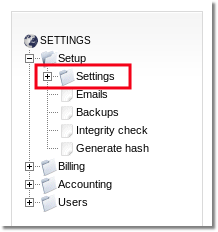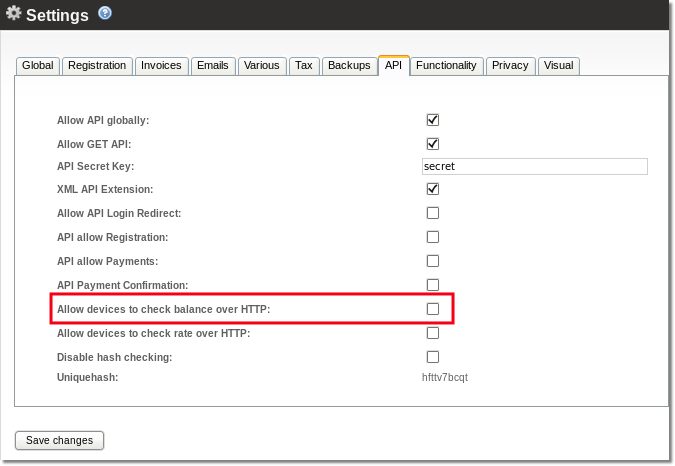Difference between revisions of "MOR API user balance get"
| (12 intermediate revisions by 3 users not shown) | |||
| Line 9: | Line 9: | ||
[[File:settings_path.png]] | [[File:settings_path.png]] | ||
<br><br> | <br><br> | ||
2. In | <!---This functionality is available from MOR 12---> | ||
2. In API tab check the marked option: | |||
<br><br> | <br><br> | ||
[[File:Settings_various_balance_over_http.png]] | [[File:Settings_various_balance_over_http.png]] | ||
<br><br> | <br><br> | ||
=Usage= | =Usage= | ||
* | * From '''MOR X4''' call: '''/api/user_balance_get''' | ||
* For Backwards-compatibility old name 'balance' is also usable. Call: | * For Backwards-compatibility old name 'balance' is also usable. Call: '''/api/balance''' | ||
* Methods: POST, GET(if allowed, not recomended) | * Methods: POST, GET(if allowed, not recomended) | ||
<br><br> | <br><br> | ||
===Parametres=== | ===Parametres=== | ||
* username – username of user whose balance you want to get. | Parameters which are '''included''' into hash(if it is used): | ||
* currency – currency code. | |||
* [[MOR API hash construction | hash]] - SHA1 hash constructed using | * username – username of user whose balance you want to get. '''Required'''. | ||
* currency – currency code or value USER in which case balance will be returned in user's currency. '''Optional'''. | |||
'''Note that parameters are shown in the same order as they have to be when generating the hash. Last parameter in a row is API_Secret_Key''' | |||
<br><br> | |||
Parameters which are '''not included''' into hash: | |||
* [[MOR API hash construction | hash]] - SHA1 hash constructed using parameters above and API_Secret_Key ([[MOR API hash construction | More described in Constructing hash]]). '''Required'''. | |||
* user_currency = 1 – in this case balance will be returned in user's currency with name of users currency. '''Optional'''. | |||
<br> | |||
'''NOTE''' Without '''currency''' or '''user_currency''' parameters API request will return Balance in [[Currencies#Default_Currency|Default System Currency]]. If user_currency is used currency parameter will be ignored. | |||
<br><br> | <br><br> | ||
===Request=== | ===Request=== | ||
HTML POST: http://<SERVER_IP>/billing/api/user_balance_get?username=USERNAME | We have username=USERNAME, API Secret Key = secret | ||
We send: | |||
HTML POST: http://<SERVER_IP>/billing/api/user_balance_get?u=admin&username=USERNAME&hash=79e75e75f9cd6821e7b661250a45294b4579f262 | |||
Optionaly you can specify currency, valid values are USER, in that case balance is returned in user's currency. And currency code(EUR, USD etc.) | Optionaly you can specify currency, valid values are USER, in that case balance is returned in user's currency. And currency code(EUR, USD etc.) | ||
HTML POST: http://<SERVER_IP>/billing/api/user_balance_get?username=USERNAME¤cy={USER|CURRENCY_CODE} | HTML POST: http://<SERVER_IP>/billing/api/user_balance_get?u=admin&username=USERNAME¤cy={USER|CURRENCY_CODE}&hash=79e75e75f9cd6821e7j5h89f6a45294b45g8u9f5 | ||
<br><br> | <br><br> | ||
===Returns=== | ===Returns=== | ||
| Line 42: | Line 59: | ||
<balance> user balance </balance> | <balance> user balance </balance> | ||
</page> | </page> | ||
With user_currency = 1 parameter. | |||
<?xml version="1.0" encoding="UTF-8"?> | |||
<page> | |||
<balance> user balance </balance> | |||
<currency> user currency </currency> | |||
</page> | |||
<br><br> | <br><br> | ||
---- | ---- | ||
| Line 66: | Line 91: | ||
</page> | </page> | ||
<br><br> | <br><br> | ||
=See Also= | =See Also= | ||
* [[MOR API]] | * [[MOR API]] | ||
Latest revision as of 08:46, 29 June 2016
Description
This feature enables you to check the balance over http.
Configuration
1. Go to SETTINGS –> Setup –> Settings

2. In API tab check the marked option:

Usage
- From MOR X4 call: /api/user_balance_get
- For Backwards-compatibility old name 'balance' is also usable. Call: /api/balance
- Methods: POST, GET(if allowed, not recomended)
Parametres
Parameters which are included into hash(if it is used):
- username – username of user whose balance you want to get. Required.
- currency – currency code or value USER in which case balance will be returned in user's currency. Optional.
Note that parameters are shown in the same order as they have to be when generating the hash. Last parameter in a row is API_Secret_Key
Parameters which are not included into hash:
- hash - SHA1 hash constructed using parameters above and API_Secret_Key ( More described in Constructing hash). Required.
- user_currency = 1 – in this case balance will be returned in user's currency with name of users currency. Optional.
NOTE Without currency or user_currency parameters API request will return Balance in Default System Currency. If user_currency is used currency parameter will be ignored.
Request
We have username=USERNAME, API Secret Key = secret
We send:
HTML POST: http://<SERVER_IP>/billing/api/user_balance_get?u=admin&username=USERNAME&hash=79e75e75f9cd6821e7b661250a45294b4579f262
Optionaly you can specify currency, valid values are USER, in that case balance is returned in user's currency. And currency code(EUR, USD etc.)
HTML POST: http://<SERVER_IP>/billing/api/user_balance_get?u=admin&username=USERNAME¤cy={USER|CURRENCY_CODE}&hash=79e75e75f9cd6821e7j5h89f6a45294b45g8u9f5
Returns
Success returns balance of user.
<?xml version="1.0" encoding="UTF-8"?> <page> <balance> user balance </balance> </page>
With user_currency = 1 parameter.
<?xml version="1.0" encoding="UTF-8"?> <page> <balance> user balance </balance> <currency> user currency </currency> </page>
Errors
When hash is incorrect.
<?xml version="1.0" encoding="UTF-8"?> <status> <error>Incorrect hash</error> </status>
When user is not found.
<?xml version="1.0" encoding="UTF-8"?> <page> <error>User was not found</error> </page>
When feature is off.
<?xml version="1.0" encoding="UTF-8"?> <page> <error>Feature disabled</error> </page>
